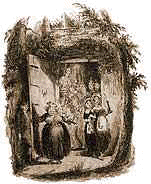|
The
Papers of the Pickwick Club. |
|
| Charles
Dickens |
The Papers of the Pickwick Club were written in 1837.
The world of Pickwick Papers, however, is not simply the world of Dingley
Dell and Eatanswill, neither is its total effect as disjointed as its
loosely-constructed technique would perhaps imply. The novel is given shape both
by a subtle development in the character of Pickwick himself and by the way in
which its thematic concerns, most notably in the sequence of events involving
Pickwick and the law, have the common element of an attack on inhumanity and
selfishness. The affair with Mrs Bardell begins as a typically Pickwickian
episode, but as Pickwick becomes more deeply involved with the legal process,
described as an instrument for 'the torture and torment of his majesty's liege
subjects' and 'the comfort and emolument' of its practitioners, there is an
increasingly serious edge to the comedy. Ultimately, in the Fleet prison,
Pickwick is brought face to face with misery and the effect is not compromised
in any way. When the 'Chancery prisoner' dies of consumption, a note is
introduced into the novel that its readers have been prepared for over a series
of scenes but which its earliest numbers hardly anticipated. In his solicitor's
office Pickwick reflects that 'When a man bleeds inwardly it is a dangerous
thing for himself; but when he laughs inwardly, it bodes no good to other
people' (ch. 31); the thought has an intensity that indicates the development of
Pickwick himself from a myopic comic butt to a figure of wisdom and sensitivity.
He himself may not be aware of the development, which was perhaps to some extent
subconscious on the part of his creator, but it is consistent with a gradual
process of unification that is apparent in Pickwick Papers as a whole. If we
still remember the novel primarily in terms of its superb range of comic
incident and character we cannot re-read it and remain unaffected by its social
concern and above all by its ultimate affirmation of the pre-eminence of human
charity.
The narrative devices of Pickwick Papers, its loosely- connected sequence
of events, its interpolated stories and its mildly mock-heroic set-pieces, are
techniques that Dickens had learnt from his eighteenth-century predecessors;
from them also he inherited the comic amplitude and boisterous humour that is
typical of much of the book. Pickwick drinks himself to sleep in Mr Wardle's
wheelbarrow and is deposited as a vagabond in the village pound, there to be
pelted with rubbish; when Mr Winkle goes shooting, Mr Tupman 'saved the lives of
innumerable small birds by receiving a portion of the charge in his left arm.'
Pickwick himself comments on the source of much of the comedy: |
